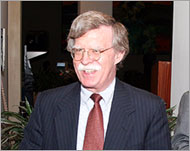US isolation on rights body increasing
The US has become increasingly isolated in its opposition to the proposed UN Human Rights Council, as its closest allies in Europe and Japan have joined many other countries and human-rights groups in backing the new body.

Kofi Annan, the UN secretary-general, said on Thursday that he was “chagrined about the US position” and doesn’t know how the issue will be resolved.
He expressed hope that the US “will find some way of associating itself with the other member states”.
World leaders at September’s UN summit decided to create a Human Rights Council to replace the discredited UN Human Rights Commission, which has been criticised for allowing some of the worst rights-offending countries to use their membership to protect one another from condemnation.
In recent years, commission members have included Sudan, Libya, Zimbabwe and Cuba. The leaders left the details of establishing the council to the General Assembly, and its president, Jan Eliasson, spent the past five months overseeing often contentious negotiations before producing what he hoped would be a final compromise proposal last week.
While the draft didn’t give any country everything it wanted, many said it would strengthen the UN’s human-rights efforts and signed on – including Japan and the European Union on Wednesday night.
Serious deficiencies
The US announced on Monday that it would vote against the council unless the draft was renegotiated to correct what it views as serious deficiencies, especially the chance that countries abusing human rights could become members.
When John Bolton, the US ambassador, was asked on Thursday about the growing support for the council, he said “we understood what the lay of the land was when we made our decision that the current draft was unacceptable”.
While Bolton and Eliasson do not agree on the text, they do agree that there is not much support for reopening negotiations.
 |
|
Bolton says the US will vote ‘no’ |
Many supporters have warned that new negotiations would weaken the draft resolution now on the table though Bolton has said there is no evidence to support this argument.
Bolton said on Thursday that since there is little interest in renegotiating the text, the other options are to put off action for a few months, or put the draft to a vote, in which case he will vote “no”.
Kenzo Oshima, Japan’s UN ambassador, said that he believes “there is a broad consensus” among member states and that it is time to vote. “But they’re also asking the question … what is the meaning, what is the value without the US?” he said.
“I think there will have to be just a bit of cooling off for members to ponder and for the president to think about the way forward.”
US support needed
Emyr Jones Parry, Britain’s UN ambassador, said his country can accept the text but said Britain believes that for the council to be effective, it will need US support.
Britain “encourages discussion with the US administration in order to identify a basis for the widest possible support” for the new council, he said in a statement.
|
“I don’t think we should see it as isolating the US, or the US versus the others” Kofi Annan, |
The US had lobbied for a permanent Human Rights Council of 30 members chosen primarily for their commitment to human rights by a two-thirds vote of the General Assembly, to try to keep countries abusing human rights off.
Under the new proposal, the 53-member Human Rights Commission would be replaced by a 47-member Human Rights Council that would be elected by an absolute majority of the 191-member General Assembly – 96 members.
Eliasson said the draft would require every council member to “uphold the highest standards in the promotion and protection of human rights” and have their human-rights record reviewed during their three-year term.
Bolton said the US still wants members to be elected by a two-thirds vote, and opposes a two-term limit for a country to serve on the council.